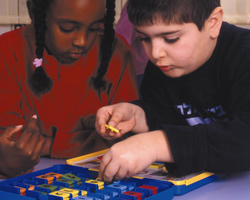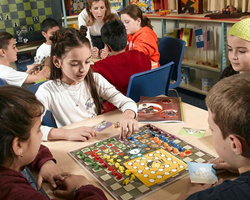| |
 |
|
The Four Goals |
 |
|
|
| |
| Developing Self Awareness |
|
| Awareness of thinking processes is essential for personal enhancement in every walk of life. The
Mind Lab method stresses the need for reflective and cognizant
thinking, which assesses thinking processes and enables students to
constantly progress. |
|
| Imparting Thinking Skills |
|
| In our information-rich age, an ever-increasing emphasis is being placed on the importance of basic thinking skills. The
Mind Lab method provides a broad range of skills: problem solving
strategies, decision-making models, research processes, information and
data management, logical and mathematical thinking, verbal and
communication skills, and more. |
|
| Strengthening Life Skills |
|
| The game experience is an extraordinary simulative tool for the development of emotional and social intelligence. It
obligates players to deal with situations involving cooperation
and competition, winning and losing, success and failure, and it
reinforces our ability to effectively manage and control our emotions,
to defer gratification and to enhance our determination, persistence
and self-discipline. |
|
| Interdisciplinary Transference |
|
| The ability to perform interdisciplinary transference is considered
by many researchers to be one of the most important forms of learning
today. Mind Lab's unique teaching method establishes an
organizing base for many aspects of our lives. Through this
method, students develop the ability to identify links between
different fields of human thinking and activity, and consequently
enables them to project and transfer this knowledge and then apply it
to other fields. |
| |
|
|
|
 |
 |
| |
The Four Goals: |
|
|
1) Developing Self Awareness
2) Imparting Thinking Skills
3) Strengthening Life Skills
4) Interdisciplinary Transference |
| |
 |
| |
 |
|